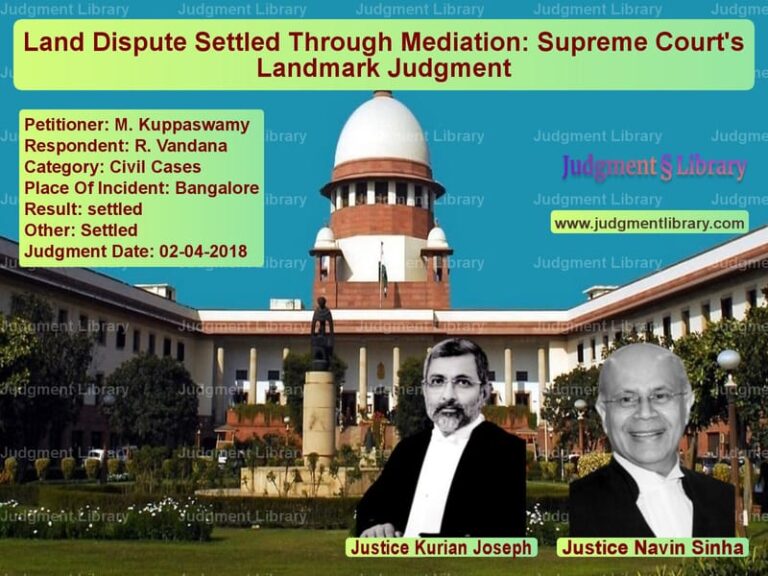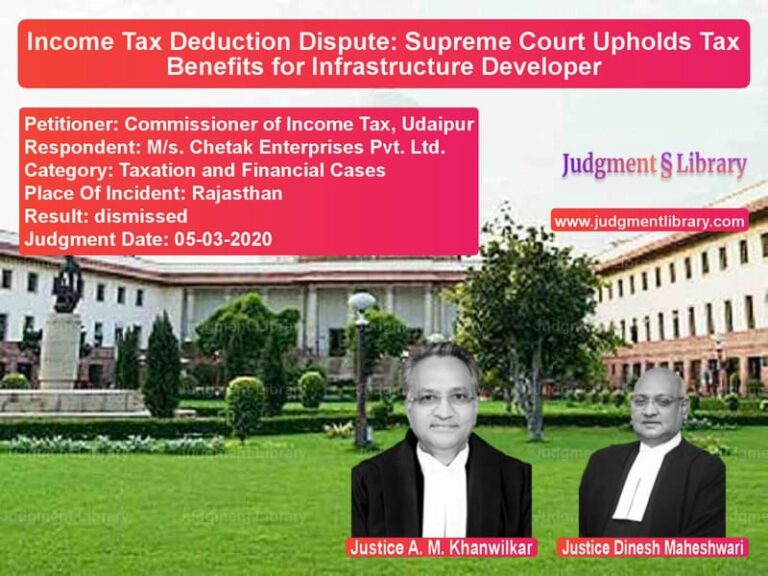Supreme Court Rejects Electricity Act Appeal Due to Delay in Filing
The case of M/S. Suryachakra Power Corporation Limited v. Electricity Department, Port Blair revolves around an appeal under Section 125 of the Electricity Act, 2003. The Supreme Court rejected the appeal due to the appellant’s failure to file within the prescribed limitation period. This judgment underscores the strict adherence to procedural deadlines in cases governed by the Electricity Act.
Background of the Case
The appellant, M/S. Suryachakra Power Corporation Limited, filed an appeal against the Electricity Department, Port Blair, challenging a decision of the Appellate Tribunal for Electricity. The appeal was filed with a delay of 161 days, exceeding the maximum period allowed under Section 125 of the Electricity Act.
The appellant justified the delay by stating that it had initially pursued a review petition before the Appellate Tribunal, which was later withdrawn in favor of filing an appeal before the Supreme Court. The appellant contended that the delay should be condoned under the principles of Section 14 of the Limitation Act, 1963.
Arguments of the Petitioner
M/S. Suryachakra Power Corporation Limited raised the following arguments:
- The delay in filing the appeal was due to the time taken in prosecuting a review petition before the Appellate Tribunal.
- The delay should be condoned under Section 14 of the Limitation Act, which allows exclusion of time spent in pursuing an alternative remedy in good faith.
- The Supreme Court had condoned similar delays in past cases, and the appellant should not be penalized for seeking legal remedies.
Arguments of the Respondent
The Electricity Department, Port Blair, countered with the following claims:
- Section 125 of the Electricity Act prescribes a strict limitation period of 60 days, with an additional 60-day extension at the discretion of the Supreme Court, making a total of 120 days.
- The appellant’s delay of 161 days exceeded the maximum permissible limit, making the appeal legally non-maintainable.
- Section 5 of the Limitation Act, which allows condonation of delay for sufficient cause, is inapplicable to appeals under the Electricity Act.
Supreme Court’s Observations and Judgment
A bench comprising Justices Kurian Joseph and Rohinton Fali Nariman ruled against the appellant, stating that the delay exceeded the statutory limit and could not be condoned under the Limitation Act.
Key Observations
- The Supreme Court reaffirmed that the limitation period under Section 125 of the Electricity Act is absolute and cannot be extended beyond 120 days.
- The delay in filing a review petition does not constitute a valid ground for condonation under Section 14 of the Limitation Act.
- The Court emphasized that procedural laws must be strictly followed in statutory appeals.
Excerpts from the Judgment
The Supreme Court ruled:
“The appeal under Section 125 of the Electricity Act, 2003, has to be filed within 60 days from the date of communication of the decision or order of the Appellate Tribunal. The Supreme Court, if satisfied that the appellant was prevented by sufficient cause from filing the appeal within the said period, may allow it to be filed within a further period not exceeding 60 days. Thus, the maximum period within which an appeal can be filed is 120 days.”
It further stated:
“Since the Supreme Court cannot condone the delay beyond 60 days under Section 125 of the Electricity Act, 2003, and in the present case, the principles of Section 14 of the Limitation Act, 1963, are not attracted, the appeal is dismissed on the ground of delay.”
Legal Implications
This ruling clarifies several important legal principles:
- Statutory limitation periods must be strictly adhered to, especially in appeals under special enactments.
- Section 5 of the Limitation Act cannot be invoked to extend the limitation period under the Electricity Act.
- The Supreme Court has limited discretion in condoning delays beyond what is explicitly allowed by the statute.
Impact of the Judgment
This decision has significant consequences:
- It sets a precedent for strict enforcement of limitation periods in Electricity Act appeals.
- It clarifies that procedural non-compliance cannot be remedied through judicial discretion beyond statutory limits.
- It reinforces the importance of filing appeals within the prescribed time frame to avoid rejection on technical grounds.
Comparison with Previous Rulings
The Supreme Court has consistently upheld the principle that special statutes with specific limitation periods must be followed strictly. This decision aligns with previous rulings, such as Chhattisgarh State Electricity Board v. Central Electricity Regulatory Commission, where the Court held that Section 5 of the Limitation Act does not apply to statutory appeals under the Electricity Act.
Conclusion
The Supreme Court’s decision in M/S. Suryachakra Power Corporation Limited v. Electricity Department, Port Blair reaffirms the principle that statutory limitation periods must be respected. By dismissing the appeal due to excessive delay, the Court has reinforced the necessity of adhering to procedural deadlines in electricity law disputes.
Don’t miss out on the full details! Download the complete judgment in PDF format below and gain valuable insights instantly!
Download Judgment: MS. Suryachakra Pow vs Electricity Departme Supreme Court of India Judgment Dated 22-09-2016-1741883913663.pdf
Direct Downlaod Judgment: Direct downlaod this Judgment
See all petitions in Contract Disputes
See all petitions in Public Sector Employees
See all petitions in Judgment by Kurian Joseph
See all petitions in Judgment by Rohinton Fali Nariman
See all petitions in dismissed
See all petitions in None
See all petitions in supreme court of India judgments September 2016
See all petitions in 2016 judgments
See all posts in Civil Cases Category
See all allowed petitions in Civil Cases Category
See all Dismissed petitions in Civil Cases Category
See all partially allowed petitions in Civil Cases Category







